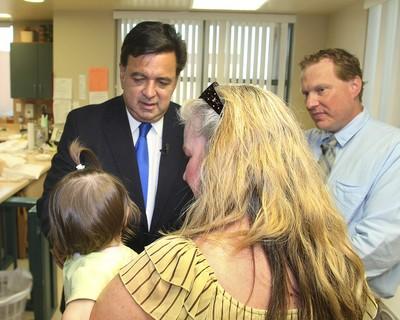Candidate sees child welfare up close

Mark Fitzgerald’s shoes are black leather, with rounded toes and thick soles, slightly scuffed, the cuffed hems of his gray slacks settling over their laces.
The shoes that Bill Richardson, the governor of New Mexico, wears are black cowboy boots, with black topstitching. But metaphorically, it was Fitzgerald’s footwear the politician was squeezing into Thursday.
Richardson, a Democratic candidate for president, arrived at the Clark County Family Services worker’s North Las Vegas home in the morning, stepping over a baby gate into the stone-tiled, Southwestern-themed kitchen for breakfast with Fitzgerald, 46, his 17-year-old adopted son, Dewey, and his 19-month-old foster child.
Richardson is the second presidential candidate to participate in the Service Employees International Union’s Walk a Day in My Shoes program, in which candidates trail a union member for a day. In April, John Edwards spent a day with a nursing home worker in New York.
Although the program’s intent is to educate candidates about the day-to-day lives of working people, Fitzgerald is hardly middle class.
A Family Services supervisor, he said he makes about $90,000 a year. But as his home life suggests, Fitzgerald’s job is more than just work to him; his life and home are consumed by the plight of Clark County’s abused and neglected children, who face a severe shortage of foster families.
For Fitzgerald, it was a chance to show Richardson what he sees every day.
"We get the cases you see in the paper about children with fractures, major head trauma, child deaths, major medical neglect kinds of situations, children not growing as fast as they should," Fitzgerald said.
All the children in the unit Fitzgerald oversees are younger than 4.
At the breakfast table, over bagels, yogurt and bananas, the baby, who cannot be named for privacy reasons, squalled and banged on a plate while Richardson asked Dewey what he thinks about politics.
"What do you want to tell me?" Richardson asked. "I’m running for president. What do you think young people like you need?"
"Mostly, when my friends and I talk about politics, we talk about the war," Dewey said. "Personally, I’m in favor of staying. I don’t know what your thing is."
Richardson favors a quick pullout of all American troops from Iraq. Rather than tell Dewey that, he quickly changed the subject, asking him what else he was concerned about as a person who will vote for the first time in 2008.
Dewey chose a less confrontational topic, his love of playing the guitar, allowing Richardson to rhapsodize about the value of teaching the arts in schools.
But for most of the day, politics seemed remote, as it largely is from Fitzgerald’s life.
A registered nonpartisan, he says he usually doesn’t have time to keep close tabs on politics and doesn’t plan to take part in the early presidential nominating caucuses Nevada is scheduled to host next year.
Washington partisanship and campaign buzzwords were far off, for example, when Fitzgerald described the succession of foster children he’s cared for, including an infant he had for more than a year and a half before returning him to the rehabilitated mother last year.
He saw the boy twice after that, but then the mother cut off contact.
That child’s photos and drawings still adorn the house, and Fitzgerald’s eyes were watery as he explained how he keeps telling himself the children he cares for are not his to keep.
Richardson rode with Fitzgerald, in his Ford pickup with a "TRY JESUS" bumper sticker, as the University of Nevada, Las Vegas-educated social worker took the baby to day care, then met with staff at Child Haven.
The two then visited a family where Fitzgerald was following up on a child abuse case.
At the cramped house near Carey Avenue and Pecos Road, trash cans, plastic chairs and paint buckets were piled in the dusty yard.
Inside, Fitzgerald talked to the family about working out a plan to help the father, who was reported to authorities for hitting his 3-year-old son, deal with his problems.
The father was no longer living with his wife and five children.
The child’s father said he and his wife, both laundry workers, had been out of work when the incident happened, and the financial stress weighed on him.
The mother said she was fired after she missed work to go to the emergency room to deal with medical problems, since she doesn’t have health insurance.
Richardson, who is Hispanic, talked to the couple, both Mexican immigrants, in Spanish as Fitzgerald and a case worker checked the children for bruises and the pantry for adequate food.
Back at Child Haven, Richardson toured the county facility for children removed from their homes, talking to the workers about the need for foster families and day-care subsidies as a row of wide-eyed toddlers looked on, gnawing on a snack of Oreos under a canopy in the rubber-floored courtyard.
After the tour, Richardson said he’d learned the importance of dedicated public employees and a strong governmental safety net for the vulnerable.
He touted his work in New Mexico to provide universal preschool and full-day kindergarten, and said that as president he would expand federal programs for children and health care.
"As a nation that seems to be very intent on spending $450 billion on a war that appears to be senseless, we don’t have enough to spend on our own people, on protecting children, on abused children," Richardson said.